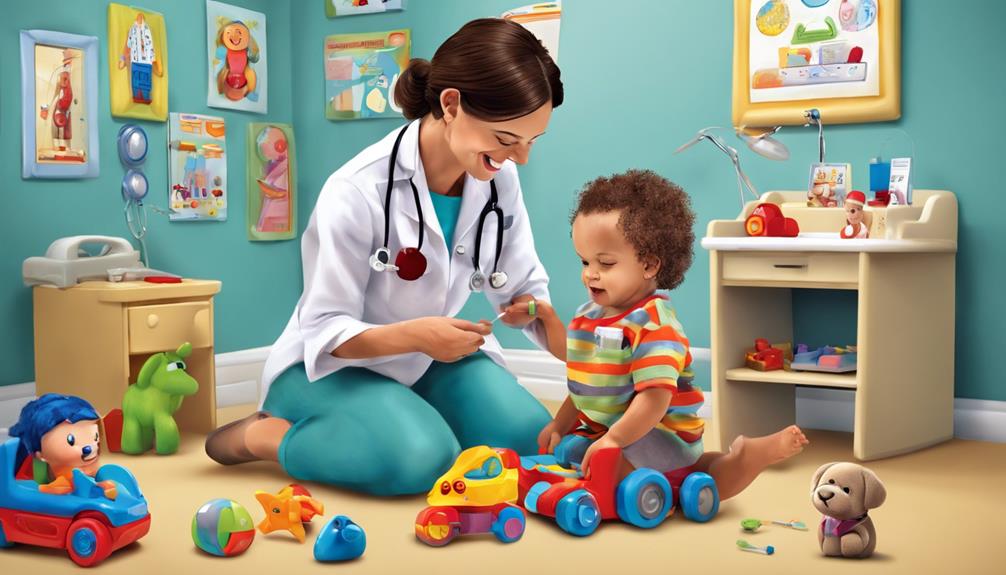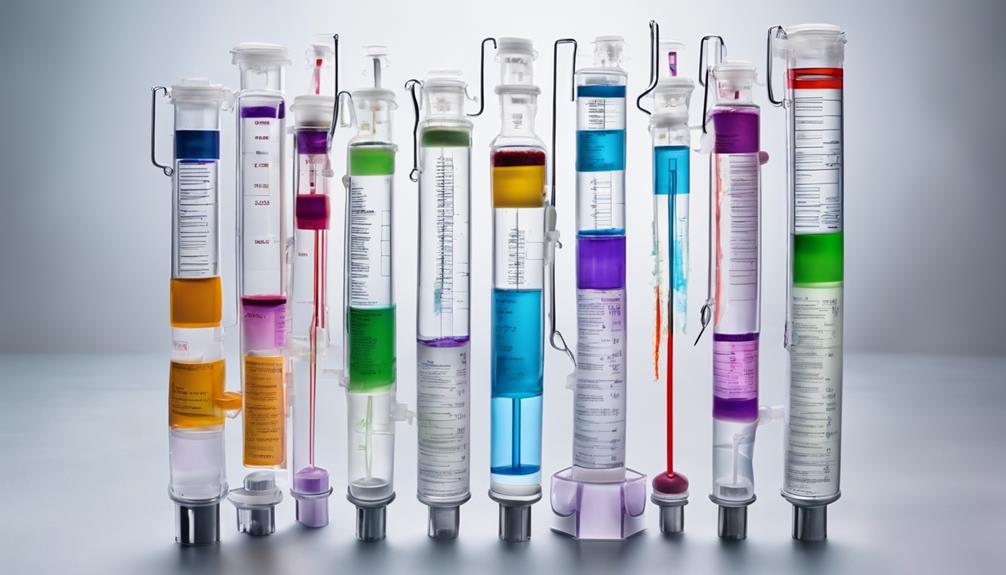At your child's 27-month check-up, it's like peering through a window into their world, a snapshot of their growth and well-being frozen in time. From physical measurements to thorough evaluations, this milestone visit offers a detailed assessment of your child's progress and health.
But what about the nuances of their language development or the subtle cues in their social interactions that might be discussed during this appointment? Let's uncover the layers of care and guidance provided to support your child's journey towards a healthy and thriving future.
Key Takeaways
- Developmental milestones in speech, motor skills, and independence are assessed.
- Health screenings cover growth, immunizations, and overall well-being.
- Nutrition and feeding habits are discussed for proper growth and health.
- Sleep patterns and routines are reviewed to ensure restful nights.
Developmental Milestones and Growth
Have your child's growth and developmental milestones been on track at their 27-month check-up? At this age, toddlers typically weigh between 27 to 32 pounds and stand about 34 to 36 inches tall. It's an exciting time as they start forming two-word sentences and expanding their vocabulary to around 50 words. Their motor skills are developing rapidly, allowing them to explore and interact with their surroundings more confidently. Children at 27 months are also showing a growing sense of independence, keen to do things on their own and with a bit of positive reinforcement, they thrive.
Potty training might be on the horizon for some families, bringing both challenges and successes. Offering healthy snacks and making sure they're getting enough vitamin D for their overall development is important. If language delays in toddlers are a concern, discussing this at the child's checkup can provide early intervention support. Celebrate each milestone achieved, big or small, as your child continues to grow and learn at their own pace.
Health Screenings and Vaccinations

During the 27-month check-up, health screenings and vaccinations are necessary to guarantee the child's continued well-being and protection against common childhood illnesses. Our healthcare provider will conduct various screenings to assess your child's growth, development, and overall health status.
Immunizations such as DTaP, IPV, and hepatitis B will be updated to make certain your child remains safeguarded against these preventable diseases. Additionally, vision, hearing, heart, lung, and developmental screenings will be performed to monitor your child's well-being thoroughly.
- Screenings for growth, development, and overall health status
- Updated immunizations for protection against common childhood illnesses
- Vision, hearing, heart, lung, and developmental screenings for thorough health monitoring
This check-up isn't only a chance to make certain your child's physical health but also an opportunity to address any concerns you may have regarding their eating habits, sleeping patterns, behavior, or milestones. Our healthcare provider is here to support you in promoting your child's well-being and to provide guidance on any health-related questions you may have.
Nutrition and Feeding Guidelines

To support your child's healthy growth and development, it's important to follow proper nutrition and feeding guidelines. When it comes to your child's diet, incorporating nutritional guidelines is key. Serve low-fat dairy and limit juice intake to guarantee essential nutrients without excess sugar. Encourage balanced meals with a variety of foods from different food groups to make sure your child receives all the necessary vitamins and minerals. Offering healthy snacks can help maintain energy levels throughout the day while avoiding high sugar, salt, and fat foods can prevent health issues in the future. Establishing regular meal times and family eating routines can create a positive environment around food and encourage healthy eating habits in your child.
| Nutritional Guidelines | Family Eating Routines |
|---|---|
| Serve low-fat dairy | Establish regular meal times |
| Limit juice intake | Encourage family meals together |
| Avoid high sugar, salt, fat | Create a positive food environment |
Sleep Patterns and Recommendations

Establishing a consistent bedtime routine for your toddler at 27 months is important for regulating sleep patterns and promoting restful and quality sleep. Toddlers at this age typically need about 11-12 hours of sleep per night, along with a daytime nap lasting 1-3 hours.
Here are some tips to help you create a soothing bedtime routine:
- Engage in calming activities like reading a book, dimming lights, and playing soothing music to signal the shift to sleep.
- Make sure your child's sleep environment is safe and comfortable, providing a conducive setting for restful sleep.
- Address any sleep-related concerns such as night waking, nightmares, or difficulty falling asleep during the 27-month check-up for guidance and support.
Activities and Behavioral Insights

As we explore the activities and behavioral insights at your child's 27-month check-up, we focus on monitoring progress in speech, hearing, and movement development. During this visit, we pay close attention to your child's social skills, behavior patterns, and interactions with others. We discuss milestones such as vocabulary expansion, promoting independence, and addressing challenges like potty training. Additionally, we provide guidance on dental care, emphasizing the importance of starting good oral hygiene habits early.
Understanding your child's speech and language development through engaging activities and conversations is crucial. Encouraging movement and physical play supports their overall growth and motor skills. By observing behavior patterns, strategies can be offered to support positive interactions with peers and adults. Each child is unique, and tailored advice is here to help your little one thrive.
Frequently Asked Questions
What Happens at 27 Month Check?
At 27 months, we get a thorough check-up. Weight, height, and other aspects are measured. We also have a physical exam to make sure we're growing well. It's a chance for our caregivers to discuss our progress and address any concerns.
Do They Draw Blood at 2 Year Check Up?
No, blood draws aren't usually part of a 2-year check-up, unless there are specific health concerns like anemia or lead exposure. We should always discuss any worries about blood draws with the healthcare provider.
What Happens at a 2 Year Check Up?
At a 2-year check-up, we measure weight, height, and BMI to track growth. A thorough physical exam checks eyes, heart, lungs, and development. Immunizations are updated, and we address milestones, concerns, and offer guidance on nutrition, safety, and well-being.
Do Babies Get Shots at 2 Year Check Up?
Yes, babies typically receive essential immunizations at their 2-year check-up, including catch-up shots. These vaccines protect against serious illnesses like hepatitis B, DTaP, and influenza, ensuring our little ones stay healthy and safe.
Conclusion
As parents, we want the best for our little ones. At the 27-month check-up, it's amazing to see how much our children have grown and developed.
Did you know that by this age, many toddlers have already learned over 200 words? It's truly a joy to witness their language skills blossom and their personalities shine.
Remember, every milestone is a step towards a bright future for our precious children.










